The Power of the Affidavit
The Power of the Affidavit
In this video we will explain the POWER OF THE AFFIDAVIT
But first, thank you for helping to restore the constitutional republic one county at a time.
For documents and instruction to help with your case please contact us at- form.jotform.com/72196346394162
The modem world of human affairs would grind to an immediate halt if the fundamental truths and underlying facts in any matter or transaction could not be established or asserted-a bill, an oath, a ledgering or bookkeeping, a statement of facts, are the life blood of the legal and commercial world. These and more are all examples of the Affidavit.
The affidavit, when properly used, especially when leveraged by your standing as a secured party, is the most powerful instrument available in protecting, defending, and asserting your sovereignty. For this reason, it is incumbent upon you to become practiced in its use and in your ability to recognize its many forms.
AFFIDAVITS BACK ALL ADHESION CONTRACTS
If you are unable to recognize when affidavits are being solicited, you may be the unwitting dupe of another parties attempt to create a binding contract. By the signature of your own hand, or before you became of legal age, the signature of your parent or other authority such as a physician, have been signing you into bondage since you were born. Certificate of Live Birth, application for a driver's license, and IRS form 1040, a voter's registration, and every single document that the system desires others to be bound or obligated by, is, or requires, an affidavit.
When signed, they represent an oath, or Commercial Affidavit, executed under penalty of perjury, "true, Correct, and complete". Affidavits may also occur in a court setting where testimony (oral) is stated in judicial terms by being sworn to be "the truth, the whole truth, and nothing but the truth, so help me God." In chapter 5 we will explore some strategies that you can use to avoid this solicitation to contract.
MAXIMS OF THE AFFIDAVIT
Before we get into the structure, form, and requirements of the formal affidavit, with examples, let's develop a deeper comprehension and understanding of the purpose, and important maxims that govern their use.
1. First and foremost, in commerce, truth is sovereign-and the Sovereign tells only the truth. Your word is your bond. If truth were not sovereign in commerce, i.e., all human action and inter-relations, there would be no basis for anything. No basis for law and order, no accountability, there would be no standards, no capacity to resolve anything. It would mean "anything goes", "each man for himself', and "nothing matters". That's worse than the law of the jungle. "To lie is to go against the mind". Oriental proverb: "Of all that is good, sublimity is supreme."
2. In commerce for any matter to be resolved, it must first be expressed. No one is a mind reader. You have to put your position out there-you have to state what the issue is in order to have something to talk about and resolve. A person must put himself on the line and assume a position, take a stand, as regards the matter at hand. One who is not damaged, put at risk, or willing to swear an oath on his commercial liability for the truth of his statements and legitimacy of his actions, has no basis to assert claims or charges and forfeits all credibility and right. Legal Maxim: "He who fails to assert his rights has none."
3. He who leaves the battlefield first, loses by default. This means that an affidavit which is un-rebutted point for point stands as "truth in commerce" because it hasn't been rebutted and has left the battlefield. Governments allegedly exist to resolve disputes, conflicts and truth. Governments allegedly exist to be substitutes for the dueling field and the battlefield for disputes. Conflicts of affidavits of truth are resolved peaceably, reasonably, instead of by violence. So people can take their disputes into court and have them all opened up and resolved, instead of going out and marching ten paces and turning to kill or injure. Legal Maxim: "He who does not repel a wrong when he can, occasions it."
4. An un-rebutted affidavit stands as truth in commerce. Claims made in your affidavit if not rebutted, emerge as the truth of the matter. Legal Maxim: "He who does deny, admits."
5. An un-rebutted affidavit becomes the judgment in commerce. There is nothing left to resolve. Any proceeding in a court, tribunal, or arbitration forum consists of a contest, or duel, of commercial affidavits wherein the points remaining un-rebutted in the end stand as truth and matters to which the judgment of the law is applied.
6. A lien or claim can be satisfied only though a point by point rebuttal of an affidavit, resolution by jury, or payment.
No court or judge can overturn or disregard or abrogate somebody's affidavit. The only one who has any capacity or right or responsibility or knowledge to rebut your affidavit, is the one who is adversely affected by it. Just as no one can know what your truth is, it's the affected parties responsibility and obligation to issue their own affidavit and to speak on their own behalf.
COMMERCIAL LAW IS PRE-JUDICIAL
Another important concept to understand as a sovereign, if you should go before the court, because it establishes the basis for keeping your matter in the private, is that Commercial Law is non-judicial, in fact, pre-judicial (not prejudice). It is the only foundation by which government or any court system can possibly exist or function. All that courts are ultimately adjudicating, and making rules about, are the fundamental precepts of Commercial Law.
Now to get an idea of all the fun that you've been missing out on by not knowing about affidavits, not even knowing that you could ASK FOR ONE, here is an example of how to leverage your knowledge of Commercial Law and the power of the affidavit.
In commerce there are two phases; assessment, and collection. The Assessment aspect, is about determining who owes who, what, why, how much, and for what reason. The collection aspect is based in International commerce that has existed for more than 6000 years. It is based on Jewish Law and the Jewish grace period, which is in units of three; three days, three weeks, and three months. This is why you get 90day letters from the IRS.
Remember, commercial processes are non-judicial. They are summary processes (short, concise without a jury).
THE POWER OF THE AFFIDAVIT
Now, the IRS creates the most activity of Commercial Collection in the entire world. The collection process is relatively valid, although the IRS is not registered to do business in any state. Did you understand what you just read? The IRS is NOT REGISTERED TO DO BUSINESS OR PERFORM COMMERCIAL MATTERS IN ANY STATE. So how do they get all the money they get? ANSWER: because you give it to them without requesting a proof of claim from them or even if they were "licensed" to give you offers based on "arbitrary" estimations.
However, this is where things get very interesting. Remember the assessment phase? THERE IS NO VALID ASSESSMENT. The IRS has, and never can, and never will, and never could, EVER issue a valid assessment lien or levy. It's not possible.
First of all, in order for them to do that there would have to be paperwork, a True Bill in Commerce. There would have to be sworn Affidavits by someone stating that this is a true, correct affidavit, complete and not meant to deceive, which, in commerce, essentially "the truth, the whole truth and nothing but the truth" when. Now, nobody in the IRS is going to take commercial liability for exposing themselves to a lie and have a chance for people to come back at them with a True Bill in Commerce, a true accounting. This means they would have to set forth the contract, the foundational instrument with your signature on it, in which you are in default, and a list of all the wonderful goods and services for which you owe them money; or a statement of all the damages that you have caused them, for which you owe them.
To my knowledge, no one has ever received goods or service from the IRS for which they owe money. I personally don't know of anyone that has damaged anybody in the IRS that gives them the right to come after us and say that "you owe us money because you damaged me". The assessment phase in the IRS is non-existent, it is a complete fraud.
This is why these rules of Commercial Law come to our rescue. T. S. Eliot wrote a wonderful little phrase in one of his poems:
"We shall not cease from exploration, and the result of all our exploring will be to arrive at the place at which we began and know it for the first time."
This is the beginning, and this is the end. This closes the circle on the process.
One reason why the super-rich bankers and the super-rich people in the world have been able to literally steal the world and subjugate, plunder, and bankrupt it all the while making chattel property out of most of us is because they know and use the rules of Commercial Law and we don't.
Because we don't know the rules, nor use them, we don't know what the game is. We don't know what to do. We don't know how to invoke our rights, remedies and recourses. We get lost in doing everything under the sun except the one and only thing that is the solution.
No one is going to explain to you what and how all this is happening to you. That is never going to happen. These powers-that-be have not divulged the rules of the game. They can and do get away with complete fraud and steal everything because no one knows what to do about it.
SOLUTION
What CAN you do about it? YOU CAN ISSUE A COMMERCIAL AFFIDAVIT. You don't have to title it that, but that's what it is. You can assert in your affidavit, "I have never been presented with any sworn affidavits that would provide validity to your assessment. It is my best and considered judgment that no such paperwork or affidavit exists." At the end of this document, you put demands on them. They must be implicit and then you state, "Should you consider my position in error . . . "
You know what they have to do now, don't you? They must come back with an affidavit which rebuts your affidavit point for point, which means they have to provide the paper work with the real assessment, the true bill in commerce, the real sworn affidavits that would make their assessment or claims against you valid.
No agent or attorney of a fictitious entity can sign an affidavit for the corporation. How can they swear as fact that the corporation has done or not done ANYTHING? They do not have the standing. They cannot and never will provide you with this. This means your affidavit stands as truth in commerce.
Note: An even more streamlined and sophisticated approach in dealing with the IRS is to send them a package with a letter and an IRS power of attorney requesting a determination of your tax status. This is more powerful because you have completely drawn them into your power. Now they have two choices, sign the papers you have given them permission to prepare on your behalf, UNDER PENALTY OF PERJURY, or give you a determination. This approach puts you out of the business of having to 'prove that you're not a taxpayer' by offering them the opportunity to admit this themselves. Or they can fill out their own death warrant. Which do you think they will choose?
DEFINITIONS
In its formal expression, an affidavit is a statement of facts that chronicle the events of a particular commercial or legal matter, reduced to writing, and sworn to or affirmed before a person legally authorized to administer an oath or affirmation such as a notary. The person making the statement is technically known as the affiant or deponent. The affidavit usually contains statements that you can attest to, based on your experience, and may also contain statements based on the observations of others if you indicate this by adding that the information is based on your 'information and belief' .
You may sometimes see affidavits titled and referred to as "Affidavits of Truth" or "Affidavits of Facts". This is informal and redundant-all affidavits are about truth and facts. Here are some formal definitions and types of affidavits and the definition for declaration since this is used in the definition for affidavit from Blacks Law 6th Edition:
1. Affidavit. A written or printed declaration or statement of facts, made voluntarily, and confirmed by the oath or affirmation of the party making it, taken before a person having authority to administer such oath or affirmation.
2. Affidavit of defense. An affidavit stating that the defendant has a good defense to the plaintiff's action on the merits; e.g. affidavit filed with motion for summary judgment.
3. Affidavit of inquiry. By court rule in certain states, substituted service of process may be had on absent defendants if it appears by affidavit of plaintiffs attorney, or other person having knowledge of the facts, that defendant cannot after diligent inquiry, be served within the state
4. Affidavit of merits. One setting forth that the defendant has a meritorious defense (substantial and not technical) and stating the facts constituting the same. See affidavit of defense.
5. Affidavit of notice. A sworn statement that affiant has given proper notice of hearing to other parties to action.
6. Affidavit of service. An affidavit intended to certify the service of a writ, notice, summons, or other document or process. In federal courts, if service is made by a person other than a United States Marshall or his deputy, he shall make affidavit thereof.
7. Affidavit to hold to bail. An affidavit required in many cases before the defendant in a civil action may be arrested. Such as affidavit must contain a statement, clearly and certainly expressed, by someone acquainted with the fact, of an indebtedness from the defendant to the plaintiff, and must show a distinct cause of action.
8. Declaration. A common-law pleading, the first of the pleadings on the part of the plaintiff in an action at law, being a formal and methodical specification of the facts and circumstances constituting his cause or action. It commonly comprises several sections or divisions, called "counts", and its formal parts follow each other in this general order: Title, venue, commencement, and cause of action, counts, and conclusion. The declaration at common law, answers to the "libel" in ecclesiastical and admiralty law, the "bill" in equity, the "petition" in civil law, the "complaint" in code and rule pleading, and the "count" in real actions. The term "complaint' is used in the federal courts and in all states that have adopted Rules of Civil Procedure.
ELEMENTS & FORMATS
There are two forms of the affidavit, court brief format and letter. If your matter is private, use the letter format. The court brief format requires a case number and must be in the standard legal form. If you write an affidavit in a private matter, which then ends up in the courts, you could rewrite it in legal format; however, it is not necessary since you can submit the affidavit in letter form as an exhibit.
Contact us for examples of the court brief form of a generic affidavit. You can use it as a template for creating your own. The required elements in order are the Title, Venue, notice, introduction, statements of fact, date and signature block, and the notary block for notary information and seal.
Thank you for investing your time and attention to this important information. With your help we are restoring the constitutional-republic one county at a time.
Please subscribe to this channel and share this important videos as far and wide as you possibly can.
-
 1:01:35
1:01:35
JoeLustica
1 year agoYour power is in the affidavit. (W/Guenther)
3.93K12 -
 14:00
14:00
ConditionalAcceptanceDotCom
1 month ago $0.04 earnedUSING AN AFFIDAVIT TO EXPRESS THE TRUTH
1653 -
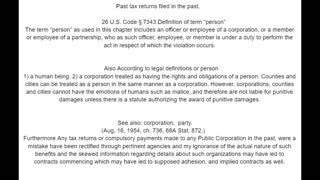 35:07
35:07
What If Everything You Were Taught Was A Lie?
1 year agoWhat Is an Affidavit of Truth? and Affidavit Certificate? and Common Law Affidavit?
810 -
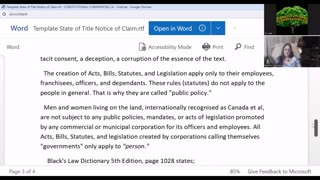 14:31
14:31
We The People - Constitutional Conventions
4 months agoNotice Proof of Claim and Contract, Consent to Contract
1.13K2 -
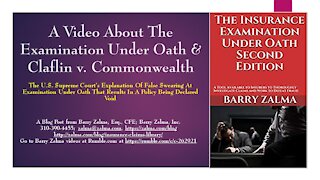 14:09
14:09
Barry Zalma, Inc. on Insurance Law
3 years agoA Video About Claflin v. Commonwealth and the Examination Under Oath
90 -
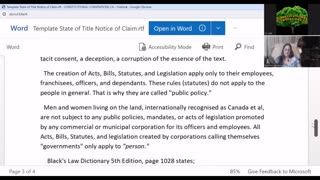 14:31
14:31
We The People - Constitutional Conventions
4 months agoNotice of Demand and Trespass Proof of Jurisdiction and Contract
9682 -
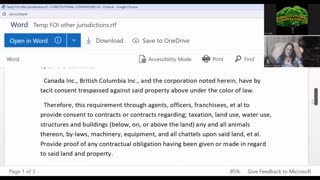 6:46
6:46
We The People - Constitutional Conventions
4 months agoNotice Proof of Claim to Taxation, by-laws et al
6894 -
 20:25
20:25
We The People - Constitutional Conventions
5 months agoParents - The Statement of Birth Record
8179 -
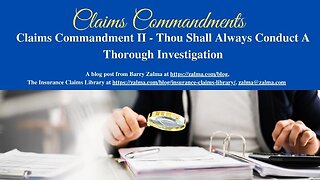 14:47
14:47
Barry Zalma, Inc. on Insurance Law
1 year agoClaims Commandment II
47 -
 51:06
51:06
Vocational Science of Freedom
1 year ago🔵The Ins and Outs of Court Part 1. | Covering: law, jurisdiction, paperwork and cases.
5111